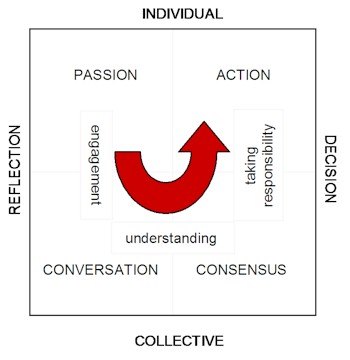 The way we act, and are seen to act, in this life is a function of two things: What we choose to do, and How we choose to do it. We can do the wrong things with style, or, as has been my wont, we can accidentally, fortuitously end up doing all the right things, badly at first, but getting better with practice.There are a small group of people I have known in my life who I would say have presence. They bring a certain charm and grace to everything they do, and they generally do it well, even if its accomplishment, in the grand scheme of things, is not very important. I greatly admire such people, and recently I have started to study them, to learn from them.In my recent post on what I learned from Patti Digh’s book Life is a Verb I described both the things that I now do, intentionally:
and (somewhat less intentionally and much less elegantly and consistently) how I do those things, my approach to action:
Intentionally, I have increased the number of hours per day I spend doing the nine things I do (above) from 5.5 hours per day to 8.5 hours per day, with an eventual target of 11.5 hours per day. And I try to do them, whenever I am self-aware, using the 7-step ‘personal presencing’ process listed above. This is very much a passion-to-action ‘U’ process: sensing, learning, asking, opening, letting go and letting come, and then realizing, with others. I am, alas, not self-aware often enough, although I have taken to wearing a bracelet as a constant reminder not to get sidetracked from the nine things I am meant to do, to do the less fruitful and ultimately unimportant things that we are so relentlessly expected to do; as a constant reminder to follow my 7-step approach to action; and as a constant reminder to practice whatever specific exercises I have committed to do to improve my capacities. As I apply the above, I reflect with some awe on the fact that my intentional behaviour is now guided substantially from what I have learned from people in my gravitational community: The three charts above are my personal adaptations of models developed by Chris Corrigan, Patti Digh and Cyndy Roy respectively — three people I have never met in person. So it was with great anticipation that I read the highly-recommended (by four people in my gravitational community) book Improv Wisdom, by Patricia Ryan Madson. I hoped that, through practicing improvisation, I could refine and make easier my 7-step process. Madson’s book is delightful slim (148 small pages) and readable. It has some wonderful insights in it. It is based around a set of ‘maxims’ which, paraphrased, combined and oversimplified a bit, are as follows:
Madson notes that there are some activities that do not lend themselves to improvisation, that need to be done in a planned, precise, intentional way, but these activities are rare, and most of what we do is better done without a script. Improvisation takes some courage, self-confidence, and faith in others, which are also qualities best learned through practice. Madson asks us to ask ourselves: What would you do if you knew you would not fail? These ten qualities of excellent improvisation are imbued with generosity, humility and grace. To some extent you need to bring them to the practice of improvisation, and to some extent they are what you acquire and learn through improvisation, in a virtuous cycle. I’ve tried to figure out how these ten qualities of improvisation fit with my seven step approach to action. I’ve concluded, I think, that they are guidelines and hints on how to be better at sensing, self-control, understanding, questioning, imagining, offering, and collaborating. Andhow to cope when you run into trouble with any of the seven steps. I’m still learning. Once I’ve practiced a bit more I’ll let you know. Swan photo from Kevin at Bastish. Category: Let-Self-Change
|
Navigation
Collapsniks
Albert Bates (US)
Andrew Nikiforuk (CA)
Brutus (US)
Carolyn Baker (US)*
Catherine Ingram (US)
Chris Hedges (US)
Dahr Jamail (US)
Dean Spillane-Walker (US)*
Derrick Jensen (US)
Dougald & Paul (IE/SE)*
Erik Michaels (US)
Gail Tverberg (US)
Guy McPherson (US)
Honest Sorcerer
Janaia & Robin (US)*
Jem Bendell (UK)
Mari Werner
Michael Dowd (US)*
Nate Hagens (US)
Paul Heft (US)*
Post Carbon Inst. (US)
Resilience (US)
Richard Heinberg (US)
Robert Jensen (US)
Roy Scranton (US)
Sam Mitchell (US)
Tim Morgan (UK)
Tim Watkins (UK)
Umair Haque (UK)
William Rees (CA)
XrayMike (AU)
Radical Non-Duality
Tony Parsons
Jim Newman
Tim Cliss
Andreas Müller
Kenneth Madden
Emerson Lim
Nancy Neithercut
Rosemarijn Roes
Frank McCaughey
Clare Cherikoff
Ere Parek, Izzy Cloke, Zabi AmaniEssential Reading
Archive by Category
My Bio, Contact Info, Signature Posts
About the Author (2023)
My Circles
E-mail me
--- My Best 200 Posts, 2003-22 by category, from newest to oldest ---
Collapse Watch:
Hope — On the Balance of Probabilities
The Caste War for the Dregs
Recuperation, Accommodation, Resilience
How Do We Teach the Critical Skills
Collapse Not Apocalypse
Effective Activism
'Making Sense of the World' Reading List
Notes From the Rising Dark
What is Exponential Decay
Collapse: Slowly Then Suddenly
Slouching Towards Bethlehem
Making Sense of Who We Are
What Would Net-Zero Emissions Look Like?
Post Collapse with Michael Dowd (video)
Why Economic Collapse Will Precede Climate Collapse
Being Adaptable: A Reminder List
A Culture of Fear
What Will It Take?
A Future Without Us
Dean Walker Interview (video)
The Mushroom at the End of the World
What Would It Take To Live Sustainably?
The New Political Map (Poster)
Beyond Belief
Complexity and Collapse
Requiem for a Species
Civilization Disease
What a Desolated Earth Looks Like
If We Had a Better Story...
Giving Up on Environmentalism
The Hard Part is Finding People Who Care
Going Vegan
The Dark & Gathering Sameness of the World
The End of Philosophy
A Short History of Progress
The Boiling Frog
Our Culture / Ourselves:
A CoVid-19 Recap
What It Means to be Human
A Culture Built on Wrong Models
Understanding Conservatives
Our Unique Capacity for Hatred
Not Meant to Govern Each Other
The Humanist Trap
Credulous
Amazing What People Get Used To
My Reluctant Misanthropy
The Dawn of Everything
Species Shame
Why Misinformation Doesn't Work
The Lab-Leak Hypothesis
The Right to Die
CoVid-19: Go for Zero
Pollard's Laws
On Caste
The Process of Self-Organization
The Tragic Spread of Misinformation
A Better Way to Work
The Needs of the Moment
Ask Yourself This
What to Believe Now?
Rogue Primate
Conversation & Silence
The Language of Our Eyes
True Story
May I Ask a Question?
Cultural Acedia: When We Can No Longer Care
Useless Advice
Several Short Sentences About Learning
Why I Don't Want to Hear Your Story
A Harvest of Myths
The Qualities of a Great Story
The Trouble With Stories
A Model of Identity & Community
Not Ready to Do What's Needed
A Culture of Dependence
So What's Next
Ten Things to Do When You're Feeling Hopeless
No Use to the World Broken
Living in Another World
Does Language Restrict What We Can Think?
The Value of Conversation Manifesto Nobody Knows Anything
If I Only Had 37 Days
The Only Life We Know
A Long Way Down
No Noble Savages
Figments of Reality
Too Far Ahead
Learning From Nature
The Rogue Animal
How the World Really Works:
Making Sense of Scents
An Age of Wonder
The Truth About Ukraine
Navigating Complexity
The Supply Chain Problem
The Promise of Dialogue
Too Dumb to Take Care of Ourselves
Extinction Capitalism
Homeless
Republicans Slide Into Fascism
All the Things I Was Wrong About
Several Short Sentences About Sharks
How Change Happens
What's the Best Possible Outcome?
The Perpetual Growth Machine
We Make Zero
How Long We've Been Around (graphic)
If You Wanted to Sabotage the Elections
Collective Intelligence & Complexity
Ten Things I Wish I'd Learned Earlier
The Problem With Systems
Against Hope (Video)
The Admission of Necessary Ignorance
Several Short Sentences About Jellyfish
Loren Eiseley, in Verse
A Synopsis of 'Finding the Sweet Spot'
Learning from Indigenous Cultures
The Gift Economy
The Job of the Media
The Wal-Mart Dilemma
The Illusion of the Separate Self, and Free Will:
No Free Will, No Freedom
The Other Side of 'No Me'
This Body Takes Me For a Walk
The Only One Who Really Knew Me
No Free Will — Fightin' Words
The Paradox of the Self
A Radical Non-Duality FAQ
What We Think We Know
Bark Bark Bark Bark Bark Bark Bark
Healing From Ourselves
The Entanglement Hypothesis
Nothing Needs to Happen
Nothing to Say About This
What I Wanted to Believe
A Continuous Reassemblage of Meaning
No Choice But to Misbehave
What's Apparently Happening
A Different Kind of Animal
Happy Now?
This Creature
Did Early Humans Have Selves?
Nothing On Offer Here
Even Simpler and More Hopeless Than That
Glimpses
How Our Bodies Sense the World
Fragments
What Happens in Vagus
We Have No Choice
Never Comfortable in the Skin of Self
Letting Go of the Story of Me
All There Is, Is This
A Theory of No Mind
Creative Works:
Mindful Wanderings (Reflections) (Archive)
A Prayer to No One
Frogs' Hollow (Short Story)
We Do What We Do (Poem)
Negative Assertions (Poem)
Reminder (Short Story)
A Canadian Sorry (Satire)
Under No Illusions (Short Story)
The Ever-Stranger (Poem)
The Fortune Teller (Short Story)
Non-Duality Dude (Play)
Your Self: An Owner's Manual (Satire)
All the Things I Thought I Knew (Short Story)
On the Shoulders of Giants (Short Story)
Improv (Poem)
Calling the Cage Freedom (Short Story)
Rune (Poem)
Only This (Poem)
The Other Extinction (Short Story)
Invisible (Poem)
Disruption (Short Story)
A Thought-Less Experiment (Poem)
Speaking Grosbeak (Short Story)
The Only Way There (Short Story)
The Wild Man (Short Story)
Flywheel (Short Story)
The Opposite of Presence (Satire)
How to Make Love Last (Poem)
The Horses' Bodies (Poem)
Enough (Lament)
Distracted (Short Story)
Worse, Still (Poem)
Conjurer (Satire)
A Conversation (Short Story)
Farewell to Albion (Poem)
My Other Sites






Great blog.Reading about things that need to be done in a precise way, following set procedure. I have realised why I am in the wrong job. Reacting to situations is what I do best. Sadly as an adminstrator following procedures is what I need to be good at!
I am THRILLED that you have found so much utility in Improv Wisdom and that it is helping you to refine and follow your own important purposes. I see we are joint cheerleaders for the amazing Patti Digh. I am honored to share the back cover with you on her amazing new book. Thank you, thank you, thank you for fhelping to spread the word on my book. Your careful reading means alot to me.Warm regards,Patricia Ryan Madson
Thank you for suggesting this book in your blog, after that I said “yes, I will read it”. The day I was reading the first maxim, I was asked by my daughter (21 years) to take her to the university by car… usually I would have said “no, take your bus and don’t bother me, please” but instead I said “ok, I will do” and she was really happy for this unexpected answer!! “just show up” was a reason to go to a meeting with people I didn’t know and it was very nice. I have to practioe very much.. To me “improv” is also not having any clues about what to do, and most of these times I had to improv in dramatical and sad situations, as no one taught me how to act in these moments… so it is important to remember, and Patricia said also this, that you can ask for help, as you are not alone- our time is so short that we couldn’t waste it :-) and meaningless acts of kindness make our lives better. Thank you Patricia.